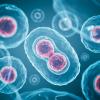News Headlines
 A new study led by space chemist Jordy Bouwman may reveal a missing link in how certain organic molecules form in outer space. They include buckminsterfullerine, sometimes known as the "buckyball," a molecule that bears a striking resemblance to a soccer ball.
A new study led by space chemist Jordy Bouwman may reveal a missing link in how certain organic molecules form in outer space. They include buckminsterfullerine, sometimes known as the "buckyball," a molecule that bears a striking resemblance to a soccer ball. Findings show the unprecedented speed of retreat is similar to the dramatic glacier retreats that occurred at the end of the last ice age.
Findings show the unprecedented speed of retreat is similar to the dramatic glacier retreats that occurred at the end of the last ice age. New research shows that cellular storage units known as “P bodies” play a critical role in cell differentiation. The findings could open new avenues for fertility treatments and regenerative medicine.
New research shows that cellular storage units known as “P bodies” play a critical role in cell differentiation. The findings could open new avenues for fertility treatments and regenerative medicine. Azza Kamal, preservationist and professor of sustainable planning, laments the leveling of a section of the White House to add a ballroom.
Azza Kamal, preservationist and professor of sustainable planning, laments the leveling of a section of the White House to add a ballroom. CU Boulder researchers continued to deliver meaningful, positive outcomes in the university's public research mission through strong results in fiscal year 2024–25.
CU Boulder researchers continued to deliver meaningful, positive outcomes in the university's public research mission through strong results in fiscal year 2024–25. Brian Breitsch is improving our understanding of the upper atmosphere in some of the most isolated places on Earth, thanks to an $840,000 federal grant.
Brian Breitsch is improving our understanding of the upper atmosphere in some of the most isolated places on Earth, thanks to an $840,000 federal grant. The Russian military claims to have flown its Burevestnik nuclear-powered cruise missile 8,700 miles over 15 hours. Read from CU expert Iain Boyd on The Conversation.
The Russian military claims to have flown its Burevestnik nuclear-powered cruise missile 8,700 miles over 15 hours. Read from CU expert Iain Boyd on The Conversation. Horror movies offer messages about the world we live in, even if the filmmakers never intended to comment on society. Sociologist Laura Patterson wants her students to be aware of what films are telling them.
Horror movies offer messages about the world we live in, even if the filmmakers never intended to comment on society. Sociologist Laura Patterson wants her students to be aware of what films are telling them. Forty years after the launch of the Nintendo Entertainment System, the name remains synonymous with worldwide gaming and technological innovation.
Forty years after the launch of the Nintendo Entertainment System, the name remains synonymous with worldwide gaming and technological innovation. Researchers have identified a brain circuit that helps animals swiftly respond to perceived threats—and dial down that response when they learn there’s no real danger. In people with anxiety disorders, this circuit may be broken.
Researchers have identified a brain circuit that helps animals swiftly respond to perceived threats—and dial down that response when they learn there’s no real danger. In people with anxiety disorders, this circuit may be broken.


